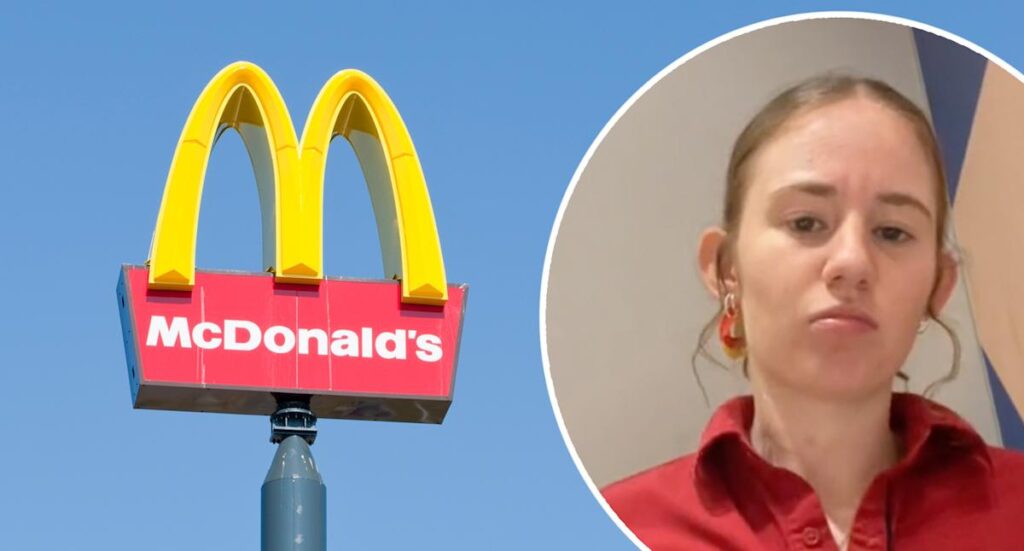In a surprising revelation that has sparked both amusement and debate on social media, a McDonald’s worker reveals customers who greet them may be ignored. This counterintuitive claim challenges conventional wisdom about customer service, where friendliness is typically expected to earn better service. As the fast food giant continues to serve millions daily, this inside scoop from a frontline employee pulls back the curtain on what really happens behind the counter—and it’s not what most people would expect.
A Viral Confession
The statement “McDonald’s worker reveals customers who greet them may be ignored” originated from a now-viral TikTok video. In the short clip, a McDonald’s employee explained that customers who open their orders with polite greetings like “Hi, how are you?” might actually face longer wait times or delayed acknowledgment, not because the workers are rude, but because of the structure and pressure of fast food operations.
To be clear, the worker did not suggest that kindness is punished intentionally. Rather, they highlighted how a rigid script and the need for speed influence interactions. “We’re trained to get orders in fast, move the line along, and minimize wait time. So when someone says ‘hello’ or starts a conversation, it actually disrupts the rhythm,” the employee said.
Why Politeness Might Be Ignored
The claim that a McDonald’s worker reveals customers who greet them may be ignored reflects deeper issues within the fast food service model. To understand this, we need to examine the fast-paced environment McDonald’s employees operate in. Drive-thru speed, customer service scores, and labor efficiency are all tracked closely. Workers are often given time targets for how long it should take to greet a customer, take their order, and deliver food.
In this context, pleasantries can feel like time-consuming distractions. When a customer starts with “Hi, how are you today?” it might delay the worker from jumping straight into the order process. This doesn’t mean they dislike being greeted—it means the system isn’t designed to accommodate small talk.
Moreover, workers wear headsets connected to timers and sensors. They might be juggling multiple tasks: taking an order, prepping a drink, and communicating with the kitchen. In such a multitasking environment, spontaneous conversations don’t always get the attention they deserve.
The Human Side of Fast Food
Despite the somewhat shocking claim that a McDonald’s worker reveals customers who greet them may be ignored, it’s crucial to remember the human element behind every transaction. Workers aren’t robots—they’re people trying to do a challenging job, often under pressure, and with limited support.
Some employees chimed in on social media to clarify: while greetings might be momentarily overlooked, it doesn’t mean they are unappreciated. In fact, many workers said polite customers are remembered fondly—even if they’re not immediately acknowledged. “We might not always respond to a ‘hi,’ but we notice,” one former employee posted. “It makes a difference, even if we can’t say it right away.”
Reactions from the Public
The phrase McDonald’s worker reveals customers who greet them may be ignored quickly sparked debate. Some critics accused workers of being unprofessional or lazy. Others, however, sympathized with their situation, arguing that corporate policies often make it impossible to act humanely while meeting performance targets.
Many commenters were stunned, believing that politeness should always be rewarded. One TikTok viewer wrote, “That’s crazy. I say ‘hi’ because I respect you, not to slow you down.” Another pointed out that this revelation highlights the dehumanization of both customers and employees in the fast food industry.
On the flip side, many industry veterans confirmed the story’s truth. One former fast-food manager commented, “It’s not about being rude—it’s about surviving the shift.”
What This Says About Customer Service Culture
At its core, the claim that a McDonald’s worker reveals customers who greet them may be ignored points to a larger issue: the tension between corporate efficiency and human connection. McDonald’s and other fast food chains are structured for maximum output. Workers are timed, evaluated, and even reprimanded for moving too slowly. In such a rigid system, authentic human interactions can become casualties of the workflow.
This revelation invites us to rethink what customer service really means. Is it about speed and convenience at all costs? Or is it about mutual respect between customer and employee? Can both coexist?
The Bigger Picture: Automation and Burnout
As discussions about this topic swirl online, some observers suggest that this problem may foreshadow a deeper transition in fast food—toward automation. With self-service kiosks and AI-powered drive-thrus becoming more common, chains like McDonald’s are slowly removing the human element altogether.
If a McDonald’s worker reveals customers who greet them may be ignored, it may not be because they don’t care—it may be because they are working within a system that doesn’t allow them to care. Burnout is real. High turnover rates, low wages, and understaffed shifts leave little room for personal engagement.
Should Customers Still Be Polite?
Absolutely. Even if a McDonald’s worker reveals customers who greet them may be ignored, kindness should never go out of style. A greeting, a smile, a thank you—these small acts matter, especially in an industry where employees often feel invisible.
Just because a worker doesn’t respond doesn’t mean your effort went unnoticed. And while it might not speed up your service, it contributes to a more respectful atmosphere. As one commenter put it, “Being kind isn’t about getting something in return—it’s about being decent.”
Final Thoughts
The viral moment when a McDonald’s worker reveals customers who greet them may be ignored shines a light on the often-overlooked realities of fast food service. It’s not about rudeness or ingratitude—it’s about an environment that prioritizes speed over sincerity.
As customers, we can still choose kindness. And as society, perhaps we should advocate for systems that allow both workers and patrons to engage in meaningful, respectful exchanges. Maybe one day, a simple “hello” won’t be seen as an obstacle, but as a welcome part of the job.
Until then, keep greeting your servers. Even if it doesn’t seem like it matters, it does.



